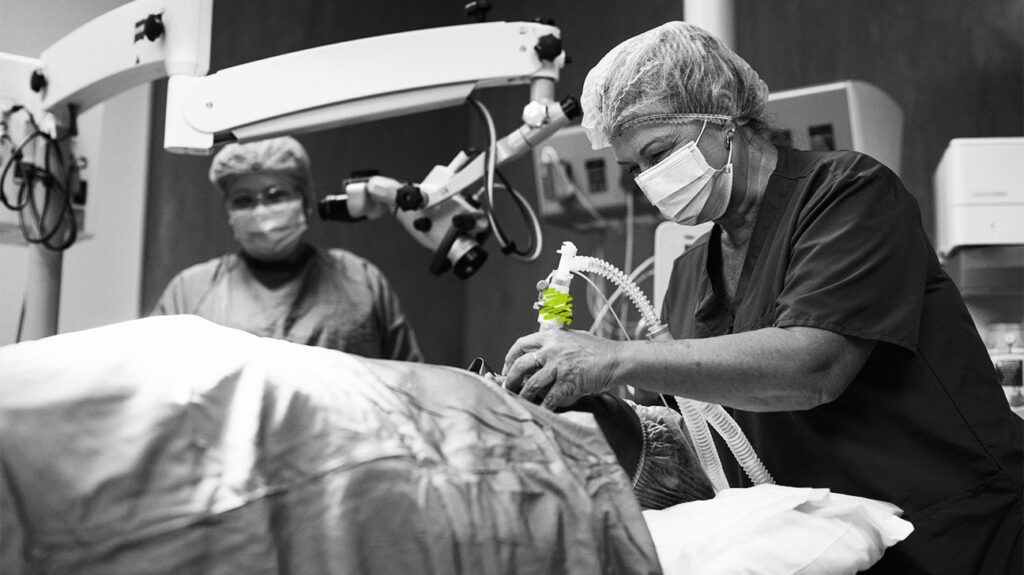Stress, significant changes within the body, and anesthesia during surgery may all cause hair loss. Hair typically regrows to normal fullness within several months after surgery.
Factors relating to surgery, including stress, head position during long surgeries, and medications, may contribute to hair loss. Some evidence suggests anesthesia may cause certain types of hair loss, or alopecia, although this requires further research.
In most cases, hair loss is likely temporary and reversible, and hair will grow back in the months after surgery. This article looks at possible causes, prevention, treatment, and outlook for those with hair loss following surgery.

A normal hair cycle includes periods of growth, resting, shedding, and regrowth. The term for the resting phase of the hair cycle is the “telogen phase.”
Stress or significant changes to the body can cause the hair to enter the telogen phase prematurely, leading to excessive shedding and hair loss. This is called telogen effluvium.
Major surgery may cause telogen effluvium, as well as factors such as:
- psychological stress
- chronic or severe illness
- high fevers
- childbirth
- severe infections
- certain medications
The following sections describe some possible causes of alopecia after surgery.
Stress
Significant stress can cause hair loss and may result in shedding up to 70% of the hair from the scalp. People may find their hair coming loose in handfuls. This may occur around 2 months after the stressful event, such as surgery.
A
Stress is
Positional alopecia
Positional alopecia is a potential, rare complication of surgery. In some cases, doctors may immobilize the head during surgery for a prolonged time.
Theories suggest that this pressure may reduce blood flow to the hair follicles, which may lead to hair loss. This may occur with surgeries lasting more than 4 hours.
Anesthesia
Some research suggests a link between anesthesia and hair loss. According to a
The study investigated whether there is a link between general anesthesia and alopecia areata. Researchers compared hair loss in people who had general anesthesia with those who did not.
The study found that the risk of alopecia areata was significantly higher in the group that received general anesthesia, with the risk increasing the longer the anesthetic lasted. The type of surgery and the anesthetic method had no impact on alopecia areata risk.
General anesthesia may cause positional alopecia, as it may result in the head staying in one position for a prolonged time.
Hypotensive anesthesia lowers a person’s blood pressure during surgery, which is also a risk factor for positional alopecia.
Medication side effects
Hair loss may occur as a side effect of certain medications with surgery or recovery.
Many chemotherapy drugs may cause hair loss, as they affect the hair during the anagen, or growth, phase of the hair cycle. Other medications that may commonly cause hair loss include:
- beta-blockers
- antiseizure drugs
- antithyroid drugs
Other medications that may cause hair loss include:
Find out how much hair loss is normal.
Type of surgery
Longer surgeries, or those lasting for more than 4 hours, may increase the risk of positional alopecia.
Head and neck surgeries may also increase the risk of positional alopecia, as it may not be possible to reposition the head during surgery.
A lack of nutrients and calories can cause hair loss. People can aim to eat a balanced diet that includes enough calories and nutrients, such as iron and protein.
It is also best to avoid smoking, as this causes inflammation in the body, which can make hair loss worse.
If people are having chemotherapy alongside surgery, wearing a cooling cap before, during, and after each treatment may help prevent hair loss.
Stress can cause hair loss, so managing stress throughout treatment and recovery may help. Ways to help manage stress
- deep breathing
- meditation
- muscle relaxation through stretching or a hot shower
- regular physical activity
If people have concerns, they can talk with a doctor about the risk of hair loss with surgery and medications, and how they might prevent it.
Techniques such as scheduled repositioning of the head and scalp massage may help prevent positional alopecia. If it is not possible for surgeons to move the head during surgery, a memory foam headrest may help reduce pressure on the scalp.
Hair will usually regrow by itself after surgery, but treatments can help promote hair regrowth. Treatment will depend on the severity of hair loss but may include:
- minoxidil, a topical scalp treatment
- laser caps and combs, or laser therapy
- microneedling of the scalp
- corticosteroid injections into affected areas
- platelet-rich plasma injections into affected areas
- prescription medications, such as finasteride or spironolactone
- hair transplant
Surgery and related factors may cause telogen effluvium, which is a common and temporary form of hair loss. The hair almost always regrows, and treatment is not necessary, although it may support regrowth.
If surgery or anesthesia causes alopecia areata, the hair may grow back by itself, or treatment can stimulate hair regrowth.
Once the stressor has gone away, the hair loss will stop and hair may return to normal within 6 to 9 months.
Surgery can cause significant stress and changes to the body, which may cause hair loss. General anesthesia or anesthesia that lowers blood pressure may also contribute to hair loss.
Once the body has recovered, the hair will usually regrow by itself over several months. Treatment is not necessary but may help stimulate hair regrowth.
